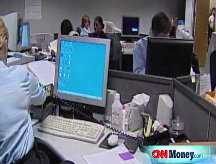Jobless claims highest since Sept. 11 attacks
Unemployment filings surge to 516,000, number of Americans continuing on benefits at 25-year high.

NEW YORK (CNNMoney.com) -- The number of Americans filing new claims for unemployment insurance last week surged to the highest levels since the wake of the Sept. 11, 2001, terrorist attacks, and the number of people continuing to collect benefits rose to a 25-year high, the government said Thursday.
The U.S. Department of Labor reported that initial filings for state jobless benefits reached 516,000 for the week ended Nov. 8. That's the highest total since the week ended Sept. 29, 2001, two weeks after the attacks against New York and Washington, when 517,000 initial claims were filed.
Economists surveyed by Briefing.com expected 479,000 claims. This week, jobless filings increased by 32,000 from the previous week's revised figure of 484,000. Last year, the figure stood at 338,000.
The report is troubling because many economists expected jobless claims to hold from the week prior, according to Andrew Gledhill, economist at Moody's Economy.com.
"The labor market is deteriorating more rapidly than previously thought," he said.
He expects weekly claims to remain above 500,000 for at least six months, due to the breadth of job losses that are being reported.
The high number of Americans continuing to collect unemployment shows that hiring conditions are poor, according to Andrew Gledhill, economist at Moody's Economy.com.
The number of Americans collecting unemployment benefits for one week or more surged by 65,000 to 3,897,000, the highest level since January 1983. The data comes from the week ended Nov. 1, the most recent available. At this time last year, the figure was 2,587,000.
The Bush administration weighed in on the jobless claim numbers.
"We know this is a tough time for many people and that's why this administration is focused on dealing with the financial situation across the board ... To get the economy moving and create jobs," according to Gordon Johndroe, a deputy press secretary.
The four-week moving average of unemployment claims, used to smooth fluctuations in the data, increased by 13,250 to 491,000 from the previous week's average of 477,750. A reading above 400,000 has been present during the past two recessions.
Ohio and Michigan, suffering from job losses related to the troubled U.S. automobile industry, reported the largest increases in initial claims.
The layoffs in those states are not likely to be reversed in coming months, Gledhill said. "Vehicle sales have been falling off a cliff, and that's not going to be reversed anytime soon."
Extended benefits were available in North Carolina and Rhode Island during the week ended Oct. 25, according to the report.
U.S. job losses have been mounting for months. Last week, the Labor Department reported the economy lost 240,000 jobs in October, bringing the total number of jobs shed in 2008 to nearly 1.2 million. The unemployment rate rose to 6.5%, a 14-year high, last month.
President-elect Barack Obama has put forth a few economic stimulus proposals, which may gain bipartisan support.
Some of his ideas include temporarily exempting the unemployed from having to pay income tax on their unemployment benefits, extending unemployment benefits, spending more on infrastructure to create jobs, and temporary tax credits for businesses that create jobs in the United States.
In the past week, Ford (F, Fortune 500) said it would cut salaried employment costs by 10%, global delivery company DHL said it was cutting 9,500 jobs and financial service provider Fidelity Investment announced 1,300 job cuts. ![]()




